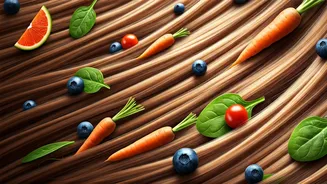Hair Health and Diet
Hair health is often a reflection of our overall well-being and is profoundly impacted by dietary choices. Nutritional deficiencies, be it of vitamins
or minerals, can significantly influence hair's condition, manifesting in various ways, such as hair loss, thinning, or changes in texture and color. Paying attention to these signs is crucial. This article delves into how insufficient intake of essential nutrients can contribute to hair-related issues. By understanding these connections, individuals can proactively adjust their dietary habits to foster healthier hair and improve their overall wellness. The article focuses on the specific deficiencies and ways to address them.
B12 Deficiency: Premature Greying
Premature greying is sometimes linked to a lack of vitamin B12. This essential vitamin plays a crucial role in the production of red blood cells, which carry oxygen to hair follicles. A deficiency can impair hair growth and color production. Addressing a B12 deficiency involves either consuming B12-rich foods, such as meat, fish, eggs, and dairy products, or considering supplementation, especially for those who follow plant-based diets. Regular monitoring of B12 levels and consulting with a healthcare professional are vital to ensure adequate intake and to address any underlying health issues that may contribute to the deficiency, thereby helping to reverse and prevent premature greying.
Zinc and Dandruff Control
Dandruff can be more than just a cosmetic nuisance; it can sometimes be a sign of a zinc deficiency. Zinc is a crucial mineral for hair growth and scalp health. It is involved in the production of new cells in hair follicles, and a lack of zinc can disrupt the cell turnover process on the scalp, which leads to dandruff. Including zinc-rich foods, like oysters, red meat, poultry, and nuts, in the diet may help to resolve dandruff and boost overall scalp health. In some instances, it may be beneficial to explore zinc supplementation under the guidance of a healthcare professional. Adequate zinc intake supports the health of the scalp and hair.
Cortisol and Hair Loss
Excessive hair loss can sometimes be linked to high levels of cortisol, often associated with chronic stress. Cortisol, the body's primary stress hormone, can disrupt the hair growth cycle. High cortisol levels can push more hair follicles into the resting phase, leading to increased shedding. Managing stress through various methods, such as regular exercise, mindfulness practices, and ensuring adequate sleep, can lower cortisol levels. A balanced lifestyle that supports mental and physical well-being is vital for controlling stress and promoting a healthy hair growth cycle. Addressing the root cause of high cortisol levels often helps to mitigate hair loss.
Iron and Thinning Hair
Hair thinning may signal an iron deficiency. Iron is a key element in carrying oxygen to the hair follicles, and when iron levels are low, this process is hindered, potentially resulting in hair thinning. Increasing dietary iron intake is important and can be achieved by including iron-rich foods, like spinach, lentils, and red meat. It’s important to note that iron absorption can be enhanced by consuming vitamin C-rich foods at the same time. In severe cases of iron deficiency, iron supplements may be needed, but it is advised that this is done under the supervision of a healthcare professional. Ensuring sufficient iron intake is very important for supporting healthy hair growth and preventing thinning.
Omega-3s for Brittle Hair
Brittle hair can be a sign of insufficient omega-3 fatty acids in the diet. Omega-3s contribute to scalp health and hair hydration. Incorporating more omega-3 rich foods, such as fatty fish like salmon, flaxseeds, and walnuts, into the diet can strengthen the hair shaft. Omega-3s can improve the hair's elasticity and overall health. For those who do not regularly consume these foods, or are unable to, supplementation with omega-3 fatty acids may be considered. Supplementation can support the hair structure from the inside out and make the hair more resilient to breakage.
Dietary Tweaks for Results
Small changes in dietary habits can produce very positive results for hair health. Integrating a balanced diet rich in essential vitamins, minerals, and healthy fats is key. Focusing on whole, unprocessed foods and reducing the intake of processed foods and sugars can contribute to healthier hair. Staying well-hydrated is also very important. Taking into account these simple adjustments in daily eating habits, such as ensuring adequate intake of necessary nutrients like iron, zinc, and omega-3s, and reducing exposure to stressful foods, can lead to visible improvements in hair quality and overall well-being. A wholesome, balanced diet nourishes hair and promotes it from within.












